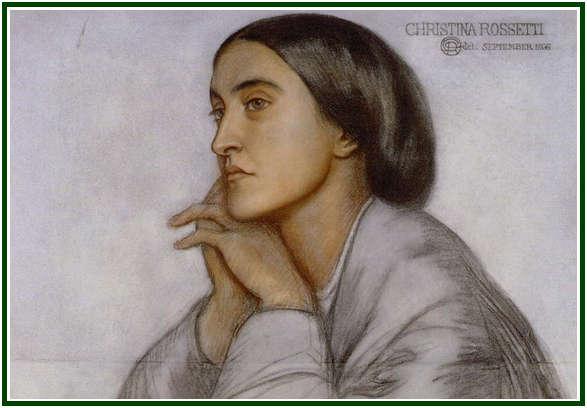
The Theosophy of a Poem by Christina Rossetti
Carlos Cardoso Aveline

Christina Rossetti, a drawing by her brother Dante Gabriel Rossetti
In the third and final part of the book “The Voice of the Silence”, we see a reference to a Path which is –
“…Steep and winds up hill; yea, to its rocky top.” [1]
The same image appears in several places in the theosophical literature. In the closing paragraphs of a Letter, a Master of the Wisdom writes to a lay disciple about the problem of anxiety during the study of theosophy:
“It is a life long task you have chosen, and somehow instead of generalizing you manage always to rest upon those details that prove the most difficult to a beginner. Take warning my good Sahib. The task is difficult and K.H. in remembrance of old times, when he loved to quote poetry, asks me to close my letter with the following to your address:
Does the road wind up-hill all the way?
Yes to the very end.
Will the day’s journey take the whole long day?
From morn to night, my friend.” [2]
Since the Mahatma wrote this letter, in 1882, these lines have been quoted a number of times in theosophical literature. Helena P. Blavatsky uses them in the opening of her remarkable article entitled “Spiritual Progress”.[3]
The author of the verses, Christina Rossetti (1830-1894), was one of the most popular poets in England in the 19th century.
A researcher in literature wrote that Christina “came to see her life as a test of her power to renounce: to live on very little as the world sees it, in the hope and expectation of a fuller reward. (…..) At the age of 24 during the Crimean war, she volunteered to nurse (…..); rejected, she worked among the London poor. (…..) After 1873 her health declined and she devoted herself more and more to religious writing.” [4]
Christina’s poem is entitled “Up-Hill” and results from direct experience. It deserves to be seen in its entirety:
“Does the road wind up-hill all the way?
Yes, to the very end.
Will the day’s journey take the whole long day?
From morn to night, my friend.
But is there for the night a resting-place?
A roof for when the slow dark hours begin.
May not the darkness hide it from my face?
You cannot miss that inn.
Shall I meet other wayfarers at night?
Those who have gone before.
Then must I knock, or call when just in sight?
They will not keep you standing at that door.
Shall I find comfort, travel-sore and weak?
Of labour you shall find the sum.
Will there be beds for me and all who seek?
Yeah, beds for all who come.” [5]
What one sows, one reaps: the “inn”, the “roof” and the “resting-place” symbolize the good karma and merits of each pilgrim.
NOTES:
[1] “The Voice of the Silence”, translated and annotated by H. P. Blavatsky, Theosophy Co., Los Angeles, 110 pp., 1987, p. 58.
[2] “The Mahatma Letters to A.P. Sinnett”, Theosophical University Press, Pasadena, California, see Letter XLIII (43), p. 262. In the Chronological Edition of the Mahatma Letters, see Letter 42.
[3] “Spiritual Progress”, an article by H.P.B. published at “Theosophical Articles”, Helena P. Blavatsky, Theosophy Co., Los Angeles, three volumes, volume II, p. 110. It was initially published at “The Theosophist”, May 1885. It is now available at our associated websites.
[4] Martin Corner, of the Kingston University, in the introduction to the volume “The Works of Christina Rossetti”, The Wordsworth Poetry Library, Wordsworth Editions Limited, Kent, Great Britain, 450 pp., 1995, p. VI.
[5] “The Works of Christina Rossetti”, The Wordsworth Poetry Library, p. 194.
000